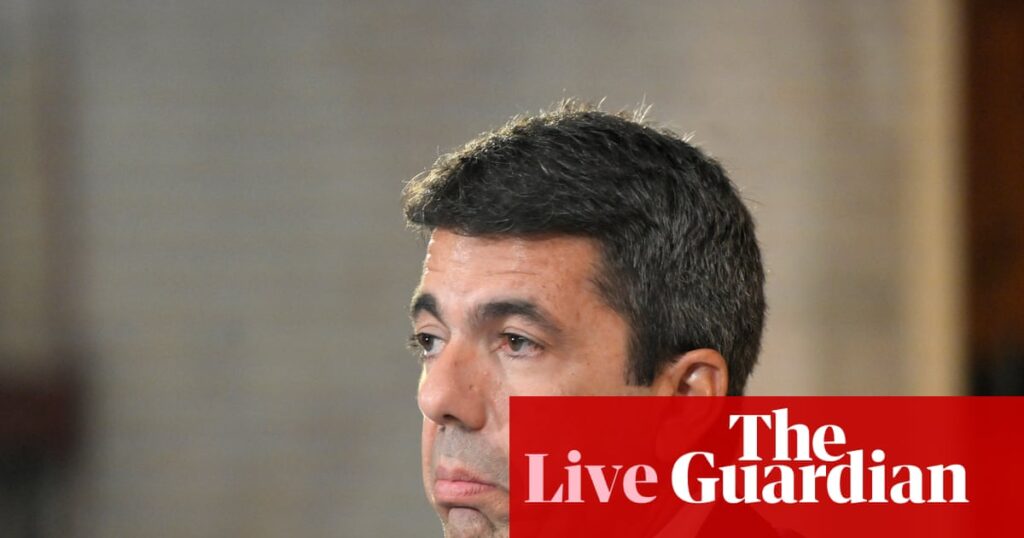‘I can’t go on anymore’ Mazón resigns as Valencia president over handling of deadly 2024 floods
Resigning his post, Mazón said “I can’t go on anymore” as he lamented “brutal” criticism he faced, while “acknowledging” mistakes made in an “unprecedented” situation.
He also repeatedly attacked the central government for not offering enough support to the flood-hit region.
But acknowledging his mistakes, he said, in comments reported by El País:
“I hope that when the noise dies down a bit, society will be able to distinguish between a man who has made a mistake and a bad person.”
He also did not say if he was calling a snap election or quitting his seat in the regional assembly, which would end his parliamentary immunity, Reuters noted.
Expect more questions on this and the practical consequences of “what’s next” to be raised on this during the day, as we hear the evidence from Maribel Vilaplana, the journalist with whom he was eating lunch on the day of the floods, testifying before a judge investigating authorities’ criminal liability for the deaths.
Key events
Czech parties sign coalition agreement amid controversy over foreign minister pick

Jon Henley
Europe correspondent
Elsewhere, Andrej Babiš, the billionaire populist whose party won last month’s Czech election, presents his three-party, right-wing coalition today amid deepening controversy over a ministerial pick that could derail the government even before iteven takes office.
The Czech president, Petr Pavel, last week officially tasked Babiš, whose ANO (Yes) party topped the 3-4 October vote with 34.5% and has 80 MPs in the 200-member parliament, with leading talks to form the new government.
The former prime minister, a polarising figure whose previous 2017-2021 premiership sparked mass protests, has formally signed a coalition agreement with the right-wing Motorists for Themselves and far-right, EU-sceptic SPD just moments ago.
However, a deepening controversy over Babiš’s planned pick for foreign minister, Filip Turek of the Motorists party, could yet throw a spanner in the works, with opposition parties appealing to the president not to confirm the nomination.
Czech media have uncovered a number of openly racist, sexist and homophobic social media posts – since deleted – allegedly made by Turek, an MEP and former racing driver, before he entered politics. The posts are being investigated by police.
He has also been investigated over an image appearing to show him making a Nazi salute, and over allegations by his former partner, who has accused him of abuse. Turek says the allegations are part of a smear campaign and denies all wrongdoing.
The Motorists party leader, Petr Macinka, has threatened to walk away from the coalition government – which would deprive Babiš of his parliamentary majority – if Turek is not appointed foreign minister.
But Pavel, who must confirm all ministerial appointments, has said that if the social media posts are proved to be authentic, Turek would be disqualified from holding a any ministerial office.
The coalition agreement, published in the Czech media on Sunday, anchors the country in Nato and makes no mention of a potential “Czexit”, as proposed by the SPD, but promises a nation-first agenda likely to spark clashes with Brussels.
The document stipulates that the EU “has limits” and should not impose decisions affecting “national sovereignty”. It also envisages closer cooperation with EU disruptors Slovakia and Hungary, and rules out adoption of the euro.
Migration and the environment seem set to be major bones of contention: the new cabinet rejects the EU’s migration and asylum pact, dismisses the Green Deal as “unsustainable”, and calls the planned 2035 phase-out of thermal cars “unattainable”.
Security policy, though, looks more or less unchanged: the incoming cabinet says it will maintain alignment with Nato, take part fully in European air-defence initiatives, and support diplomatic efforts to end the war in Ukraine.
German foreign minister draws criticism for comments on Syria returns

Deborah Cole
in Berlin
Elsewhere, Germany’s foreign minister, Johann Wadephul of the co-ruling Christian Democrats (CDU), made waves with comments signalling a softer position on returns of Syrians who arrived during the 2015-16 influx than espoused by much of the government
Wadephul, who visited Damascus last week on a Middle East tour, sounded out of step with hardline officials pushing for mass expulsions when he noted the scale of the destruction in the country from the civil war and the ongoing instability in many regions.
“They cannot go back in the short term,” he said of the hundreds of thousands of Syrians still in Germany. “People can hardly live in dignity here.”
Images on Wadephul’s Instagram account showed him walking through the Harasta suburb northeast of the capital surrounded by a landscape of ruins.
The minister’s comments drew sharp criticism from leading Christian Democrats.
Parliamentary group deputy leader Günter Krings told the mass-selling daily Bild Wadephul’s argument that the degree of destruction prohibited mass-scale deportations was “utterly inappropriate”.
“After all, who is supposed to rebuild a destroyed country if not its own citizens?” he asked. “The Syrian civil war is over, and in large parts of the country it is now possible and reasonable for the vast majority of Syrians who left to return.”
Sven Schulze, the CDU chief in the eastern state of Saxony-Anhalt, where the far-right AfD is leading in the polls ahead of a state election next year, was also critical, saying he “cannot understand the foreign minister’s comments”.
Interior minister Alexander Dobrindt of the CDU’s Bavarian sister party, the Christian Social Union, noted the coalition had already agreed on a phased-in programme for returning Syrians “beginning with criminal offenders,” he said through a spokesperson.
He made clear that he considered Wadephul’s message unhelpful at a time when Berlin is seeking to agree such returns with Damascus.
However leading Social Democrats (SPD), junior partners in the government coalition, lent Wadephul support, saying their parliamentary group shared his “assessment that returns to Syria are only possible to a very limited extent at this point in time”.
Adis Ahmetovic, the group’s foreign affairs spokesperson, told Bild: “The situation in the country remains unstable, large parts of the infrastructure have been destroyed, and a safe, dignified life is not guaranteed for many people there.”
The friction within the government coincided with unease over the arrest in Berlin at the weekend of a 22-year-old Syrian national for allegedly plotting an Islamist suicide attack in Germany. Police found bomb-making material in his flat and a string of messages on social media espousing Islamic State group propaganda.
Critics of any wholesale expulsion of Syrians underscore not only the still complex security situation in their homeland but also the high degree of integration in Germany many have achieved over the last decade.
More than 7,000 Syrian doctors are employed in Germany, many of them in regions that had been underserviced previously, according to the German Medical Association. Experts note that their absence would be keenly felt throughout the system as the German population rapidly ages.
Chancellor Friedrich Merz has made fighting irregular immigration a priority of his four-year term as he seeks to beat back the rise of the anti-migrant, anti-Islam AfD, which is leading in several national opinion polls.
Platform representing Valencia flood victims calls for protests tonight

Ashifa Kassam
Separately, a platform representing victims of the floods has called on people to take to the streets of Valencia this evening.
“We celebrate that Mazón is leaving, but without forgetting that our problems continue,” the organisation said on social media. “Our best tribute to the 229 people murdered is to continue the fight.”

Ashifa Kassam
Following Mazón’s announcement that he would leave his post as the regional head of Valencia, questions are swirling as to what comes next.
Mazón did not say if he was calling a snap election or quitting his seat in the regional assembly, which would end his parliamentary immunity.
Broadcaster Cadena Ser said it would now be up to the head of the Valencian parliament, the far-right Vox politician Llanos Massó, to contact the various political parties that have a presence in parliament and later put forward a potential candidate to replace Mazón.
During this time, sources from Mazón’s People’s party told newspaper El País that their understanding is that Mazón would stay on as acting head of the region.
Any replacement would have to be backed by parliament. If in two months, no candidate obtains the necessary votes, early elections would be called in the region.

Ashifa Kassam
Following Mazón’s speech, broadcaster Cadena Ser spoke with Rosa Álvarez, who heads an association representing victims of the floods.
“It was a painful, indignant speech… He made himself out to be victim,” she said.
She fought back tears as she described feeling as though Mazón had long brushed off the tremendous pain that she and others who lost their loved ones in the floods were suffering.
Monday’s speech had reinforced this sentiment, as it had barely mentioned the 229 people who were killed, she said. “It’s infuriating that he left this way.”
When asked if his resignation had helped to mend things, Álvarez replied: “He didn’t resign. His party didn’t force him to resign. We, the families of the victims and all the people who supported us, forced him to resign.”
We are getting some further lines from Mazón’s statement earlier today, where he said:
“I should have had the political vision to cancel my appointments and visit” the affected areas on the day of the disaster, Mazón said.
“I know I made mistakes. I acknowledge them and I will live with them all my life,” he added.
“I have asked for forgiveness, and today I repeat it again. But none of them were due to political calculation or bad faith.”
El País is reporting that after his resignation, Mazón intends to take a few days off, quoting a medical reason.
Valencia leader Mazón’s resignation speech – in pictures
For more on the anger towards Mazón and the calls for consequences after Spain’s worst natural disaster this century, it’s worth reading this report from our Spain correspondent, Sam Jones.
‘I can’t go on anymore’ Mazón resigns as Valencia president over handling of deadly 2024 floods
Resigning his post, Mazón said “I can’t go on anymore” as he lamented “brutal” criticism he faced, while “acknowledging” mistakes made in an “unprecedented” situation.
He also repeatedly attacked the central government for not offering enough support to the flood-hit region.
But acknowledging his mistakes, he said, in comments reported by El País:
“I hope that when the noise dies down a bit, society will be able to distinguish between a man who has made a mistake and a bad person.”
He also did not say if he was calling a snap election or quitting his seat in the regional assembly, which would end his parliamentary immunity, Reuters noted.
Expect more questions on this and the practical consequences of “what’s next” to be raised on this during the day, as we hear the evidence from Maribel Vilaplana, the journalist with whom he was eating lunch on the day of the floods, testifying before a judge investigating authorities’ criminal liability for the deaths.
No Tomahawks for Ukraine, for now

Jakub Krupa
US president Donald Trump said on Sunday that, for now, he is not considering a deal that would allow Ukraine to obtain long-range Tomahawk missiles for use against Russia, Reuters reported.
“No, not really,” Trump told reporters as he flew to Washington from Palm Beach, Florida, when asked whether he was considering a deal to sell the missiles. He added, however, that he could change his mind.
His comments come despite growing pressure from Ukraine’s allies and recent talks with Nato’s secretary general, Mark Rutte, at the White House. On Friday, Rutte said the issue was under review, and that it was up to the US to decide.
Over the weekend, Ukraine’s Volodymyr Zelenskyy pointedly thanked Germany and chancellor Friedrich Merz – in German – for delivery of two more air defence Patriot systems, as promised earlier this year.
He said:
“Russian airstrikes are Putin’s main stake in this war – through terror he tries to compensate for his inability to achieve his insane goals on the ground. Therefore, every strengthening of our air defence literally brings us closer to the end of the war that we are all waiting for. The less Russia achieves, the greater its motivation will be to end the war.”
I will also keep an eye on other news stories in Europe for you, including the political aftermath of the deadly floods in the Valencia region of Spain after the first anniversary last week, the latest from anti-government protests in Serbia, and the coalition talks in the Czech Republic.
It’s Monday, 3 November 2025, it’s Jakub Krupa here, and this is Europe Live.
Good morning.
Valencia leader resigns over handling of last year’s deadly floods

Sam Jones
in Madrid
Carlos Mazón, the embattled president of the eastern Spanish region of Valencia, has bowed to public fury and political pressure by resigning over his botched handling of the deadly floods that killed 229 people in the area just over a year ago.
Mazón, a member of the conservative People’s party (PP), had hung on despite calls for him to stand down after it emerged that he spent more than three hours having lunch with a journalist as the floods hit and people were drowning in their homes, garages and cars.
His stubborn refusal to quit had prompted a series of massive demonstrations across Valencia, many under the slogan: “Mud on our hands, blood on his”. A recent survey found that 75% of Valencians believed Mazón should quit.
Mazón had previously insisted there was “no government in the world that has the tools to alter, stop or avoid an episode of torrential rains that end up pummelling historical rainfall records in a given area at a given time”.
But on Monday, Mazón yielded to the inevitable and announced that he would abandon the regional presidency.


